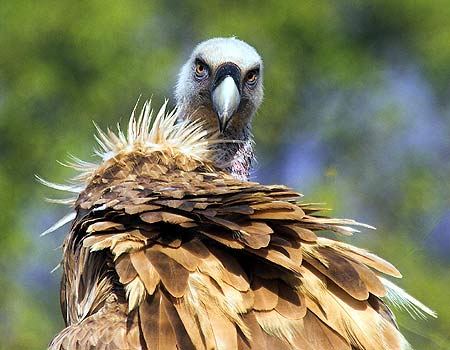Sudan says captured Vulture was on espionage mission for Israel
Chip a standard migration tracker with Israeli Park Services GPS chip.
Roi Kais
Three Days of the Condor, Sudan style: Sudanese media was a buzz Thursday, with news saying that Darfur authorities had captured a vulture carrying Israeli spy gear.

The suspect (Illustration -Unable to publicize real picture to protect the vulture’s identity). Photo: Israel Nature and National Parks Service
The suspect bird was found to be tagged with an Israeli GPS chip and a leg band labeled “Israel Nature Service” and “Hebrew University, Jerusalem.”
Khartoum’s media claimed that the device was capable of taking photos and sending them back to Israel; but Israel’s National Parks Service dismissed the allegation, saying that both the band and the GPS chip were nothing more than standard migration trackers.
Tensions between Israel and Sudan have been high since a mysterious airstrike leveled a major weapons manufacturing compound in Khartoum in October. Sudan blamed Israel for the raid. Jerusalem has remained mum on the subject.
The Opposition in Sudan was quick to mock the “spy bird” find: The country’s Justice and Equality Movement featured the news on its website, asking: “How is it possible that the regime was able to detect one vulture, but was unable to detect the jets that bombed the arms facility?”
The website further ridiculed the authorities’ report of the case, which lauded it as an “unprecedented achievement,” saying that all state reports about the bird’s seizure failed to mention whether the vulture was captured because the military’s radar picked up on its GPS signal, or whether the bird just happened to be flying by.
Ohad Hazofe, an ecologist with the Israel Nature and Parks Authority, confirmed that the bird was carrying Israeli tags, but said the vulture came to Israel from the Balkans, from which it migrates every year.
Wild birds that visit Israel as part of their migration paths are often tagged with various bands and sometimes GPS chips, to assist ornithologists in their studies.
The bird in question can fly a distance of 600km a day, Hazofe explained. “This is a young vulture that was tagged, along with 100 others, in October. He has two wing bands and a German-made GPS chip.”
The device, he stressed, has no photography capabilities. “This equipment that can give out distance and altitude readings only. That’s the only way we knew something had happened to the bird – all of a sudden it stopped flying and started traveling on the ground.”
Erez Erlichman contributed to this report.
View original Ynet publication at: http://www.ynetnews.com/articles/0,7340,L-4316770,00.html






 Israeli New Shekel Exchange Rate
Israeli New Shekel Exchange Rate